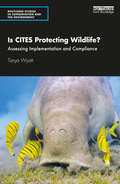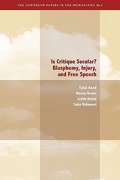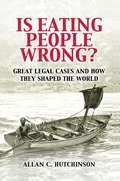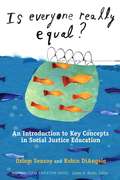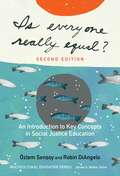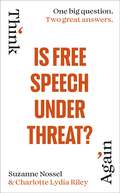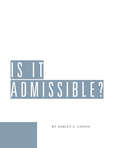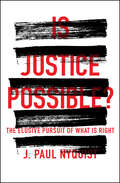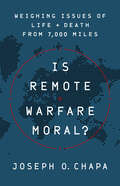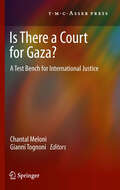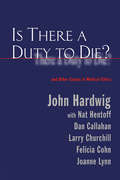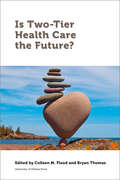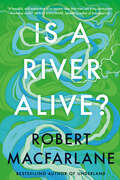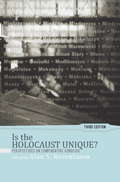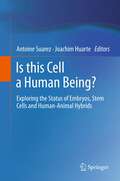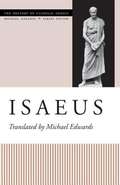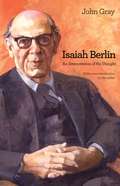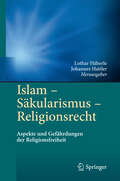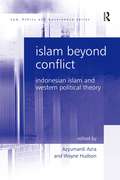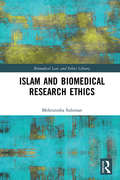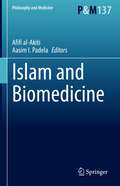- Table View
- List View
Is CITES Protecting Wildlife?: Assessing Implementation and Compliance (Routledge Studies in Conservation and the Environment)
by Tanya WyattThis book assesses the Convention on International Trade in Endangered Species of Wild Fauna and Flora (CITES), examining both implementation and compliance. Humans are causing a biodiversity crisis, where 1 million species are facing extinction. Species are dying, in no small part, because they are overexploited, poached and trafficked and CITES is the main international instrument designed to protect traded wildlife. Does the state of the world’s species mean CITES is failing? This book explores the implementation of and compliance with CITES by all 183 member countries. It is imperative we know the nature and extent of the implementation of and compliance with CITES legislation in all parties to fully understand the impact of legal and illegal trade on species survival. Through extensive legislative content analysis, a Delphi iterative survey, and semi-structured interviews, this is the first book to share empirical research about CITES implementation and compliance. This book contains a comprehensive analysis of the state of CITES, what is done well, what could be done better, and what the future might bring to try to curtail the slide of the world’s wildlife into extinction. By identifying lessons learned in relation to CITES legislation, implementation and compliance this book provides hard evidence to member countries as to how their own practice can be improved. This timely book will be essential reading for students and academics interested in wildlife law, trade and trafficking, green criminology and biodiversity conservation more broadly. It will also be of interest to professionals working in wildlife law enforcement.
Is Critique Secular? Blasphemy, Injury and Free Speech
by Judith Butler Talal Asad Wendy Brown Saba MahmoodFour leading thinkers of our times confront the paradoxes and dilemmas attending the supposed stand-off between Islam and liberal democratic values. Authors inquire into the evaluative frameworks at stake in understanding the conflicts between blasphemy and free speech, between religious taboos and freedoms of thought and expression.
Is Eating People Wrong?
by Allan C. HutchinsonGreat cases are those judicial decisions around which the common law develops. This book explores eight exemplary cases from the United Kingdom, the United States and Australia that show the law as a living, breathing and down-the-street experience. It explores the social circumstances in which the cases arose and the ordinary people whose stories influenced and shaped the law as well as the characters and institutions (lawyers, judges and courts) that did much of the heavy lifting. By examining the consequences and fallout of these decisions, the book depicts the common law as an experimental, dynamic, messy, productive, tantalizing and bottom-up process, thereby revealing the diverse and uncoordinated attempts by the courts to adapt the law to changing conditions and shifting demands. Great cases are one way to glimpse the workings of the common law as an untidy but stimulating exercise in human judgment and social accomplishment.
Is Everyone Really Equal? An Introduction to Key Concepts in Social Justice Education
by Özlem Sensoy Robin DiangeloThis practical handbook will introduce readers to social justice education, providing tools for developing "critical social justice literacy" and for taking action towards a more just society. Accessible to students from high school through graduate school, this book offers a collection of detailed and engaging explanations of key concepts in social justice education, including critical thinking, privilege, and White supremacy. Based on extensive experience in a range of settings in the United States and Canada, the authors address the most common stumbling blocks to understanding social justice. They provide recognizable examples, scenarios, and vignettes illustrating these concepts. This unique resource has many user-friendly features, including "definition boxes" for key terms, "stop boxes" to remind readers of previously explained ideas, "perspective check boxes" to draw attention to alternative standpoints, a glossary, and a chapter responding to the most common rebuttals encountered when leading discussions on concepts in critical social justice. There are discussion questions and extension activities at the end of each chapter, and an appendix designed to lend pedagogical support to those newer to teaching social justice education.
Is Everyone Really Equal?: An Introduction to Key Concepts in Social Justice Education
by Özlem Sensoy Robin DiAngelo<P>This is the new edition of the award-winning guide to social justice education. Based on the authors' extensive experience in a range of settings in the United States and Canada, the book addresses the most common stumbling blocks to understanding social justice. <P>This comprehensive resource includes new features such as: a chapter on intersectionality and classism, discussion of contemporary activisms (Black Lives Matter, Occupy, and Idle No More), material on White Settler societies and colonialism, pedagogical supports related to "common social patterns" and "vocabulary to practice using," and extensive updates throughout. <P>Accessible to students from high school through graduate school, Is Everyone Really Equal? is a detailed and engaging textbook and professional development resourcer presenting the key concepts in social justice education. The text includes many user-friendly features, examples, and vignettes to not just define but illustrate key concepts.
Is Free Speech Under Threat?
by Intelligence Squared Charlotte Lydia Riley Suzanne NosselTwo leading thinkers present alternative answers to one of the most difficult and divisive questions of our times: Is free speech under threat?Suzanne Nossel, CEO of PEN America, the leading free expression organisation, argues that alongside the necessary and long-overdue elevation of minority voices in recent years, there has also arisen an uncompromising intolerance – most notably on university campuses and online – that wrongly equates a wide range of offensive speech with violence and seeks to shut it down. This has led to an escalating free speech arms race, from which everyone loses.Charlotte Lydia Riley, historian of empire and editor of The Free Speech Wars, argues that accusations of cancel culture and defences of free speech are too often disingenuous attempts to fuel a culture war and so inhibit an important realignment in which hateful speech is at last being called out for what it is and the right to free expression is being extended to more people than ever before.Published in conjunction with Intelligence Squared, the world’s leading curator of debate, this book is part of the THINK AGAIN series: short books that present two expert, contrasting but equally persuasive views in a single volume that can be read from either end.
Is It Admissible?
by Ashley LipsonIs It Admissible? Are your objections ever overruled due to lack of specificity? Have you ever been too slow to object to inadmissible testimony? Do you waste valuable time poring through dense treatises just to see if a certain type of evidence is admissible? Do you struggle to find instant answers on evidence admissibility? Now there is help. Is It Admissible? by Ashley S. Lipson provides clear, concise, and supported answers to troublesome admissibility questions for virtually every type of evidence. Designed for use on the eve of trial or at counsel's table, Is It Admissible? provides everything you need for speedy and specific courtroom action: * Direct "yes or no" admissibility answers for each type of evidence * Quick explanation of the rule * Pattern questions for laying foundations * Admission strategies for the proponent * Exclusion arguments for the opponent * Model objection language, with responses * Color-coded tabs for quick-reference * Detailed topical index and table of cases * Coverage of civil and criminal law * Strategies for admission and exclusion * And much more The book is chock-full of novel arguments, proven strategies, and successful shortcuts.
Is Justice Possible?: The Elusive Pursuit of What is Right
by J. Paul Nyquist"Christians who take the Bible seriously dare not ignore this message. Paul Nyquist writes like an Old Testament prophet in modern America . . . &” — Leith Anderson, president, National Association of Evangelicals | Washington, DC&“Paul Nyquist brings a biblical focus and discerning look at why justice matters and how we might worktoward it.&”- Ed Stetzer, Billy Graham Chair | Wheaton College&“… [Explains] why justice often eludes us in this life, but also how we must work to achieve it as best we can.&”— Dr. Erwin W. Lutzer, pastor emeritus, The Moody Church | Chicago Why is justice so hard to come by?The innocent are convicted. The guilty get away. The scales tip toward the powerful, while the weak remain oppressed. If our world is so sophisticated, why is there so much injustice? What can believers do? Can we ever expect justice? Dr. Paul Nyquist, former president of Moody Bible Institute, addresses these questions and more in his new book, Is Justice Possible? In four parts he considers:Biblical and theological foundations of justice Obstacles to justice in human societyPractical steps for pursuing justice in political, personal, and public arenasThe hope of true justice upon Christ&’s returnAs police shootings and wrongful incarcerations raise increasing questions in the minds of Christians, Is Justice Possible? will seek to provide answers and establish biblical expectations.At its core, this is a book about an attribute of God. Rather than rely on our own ideas of justice, we must look to the One who made us and embodies justice perfectly. Only then can we pursue justice in purposeful, effective, eternal ways.
Is Justice Possible?: The Elusive Pursuit of What is Right
by J. Paul Nyquist"Christians who take the Bible seriously dare not ignore this message. Paul Nyquist writes like an Old Testament prophet in modern America . . . &” — Leith Anderson, president, National Association of Evangelicals | Washington, DC&“Paul Nyquist brings a biblical focus and discerning look at why justice matters and how we might worktoward it.&”- Ed Stetzer, Billy Graham Chair | Wheaton College&“… [Explains] why justice often eludes us in this life, but also how we must work to achieve it as best we can.&”— Dr. Erwin W. Lutzer, pastor emeritus, The Moody Church | Chicago Why is justice so hard to come by?The innocent are convicted. The guilty get away. The scales tip toward the powerful, while the weak remain oppressed. If our world is so sophisticated, why is there so much injustice? What can believers do? Can we ever expect justice? Dr. Paul Nyquist, former president of Moody Bible Institute, addresses these questions and more in his new book, Is Justice Possible? In four parts he considers:Biblical and theological foundations of justice Obstacles to justice in human societyPractical steps for pursuing justice in political, personal, and public arenasThe hope of true justice upon Christ&’s returnAs police shootings and wrongful incarcerations raise increasing questions in the minds of Christians, Is Justice Possible? will seek to provide answers and establish biblical expectations.At its core, this is a book about an attribute of God. Rather than rely on our own ideas of justice, we must look to the One who made us and embodies justice perfectly. Only then can we pursue justice in purposeful, effective, eternal ways.
Is Killing People Right?
by Allan C. Hutchinson'Great cases' are those judicial decisions around which the common law pivots. In a sequel to the instant classic Is Eating People Wrong?, this book presents eight new great cases from the United Kingdom, the United States and Australia. Written in a highly accessible yet rigorous style, it explores the social circumstances, institutions (lawyers, judges and courts) and ordinary people whose stories shaped the law. Across the courts' diverse and uncoordinated attempts to adapt to changing conditions and shifting demands, it shows the law as the living, breathing and down-the-street experience it really is. Including seminal cases in end of life, abortion and equal rights, this is an ideal introduction for students to legal history and jurisprudence.
Is Remote Warfare Moral?: Weighing Issues of Life and Death from 7,000 Miles
by Joseph O ChapaAmerica is at an important turning point. Remote warfare is not just a mainstay of post–9/11 wars, it is a harbinger of what lies ahead—a future of high-tech, artificial intelligence–enabled, and autonomous weapons systems that raise a host of new ethical questions. Most fundamentally, is remote warfare moral? And if so, why? Joseph O. Chapa, with unique credentials as Air Force officer, Predator pilot, and doctorate in moral philosophy, serves as our guide to understanding this future, able to engage in both the language of military operations and the language of moral philosophy. Through gripping accounts of remote pilots making life-and-death decisions and analysis of high-profile cases such as the killing of Iranian high government official General Qasem Soleimani, Chapa examines remote warfare within the context of the just war tradition, virtue, moral psychology, and moral responsibility. He develops the principles we should use to evaluate its morality, especially as pilots apply human judgment in morally complex combat situations. Moving on to the bigger picture, he examines how the morality of human decisions in remote war is situated within the broader moral context of US foreign policy and the future of warfare.
Is There a Court for Gaza?
by Chantal Meloni Gianni TognoniThe 'Goldstone Report' of September 2009 started a critical debate at the international level. The Report raised serious allegations of grave violations of international law with regard to the Israeli attack on Gaza of 27 December 2008 - 18 January 2009, amounting to possible war crimes and crimes against humanity. The UN General Assembly and the Human Rights Council, amidst high political pressure, endorsed the Report's recommendations, calling for prompt and proper investigations to ensure accountability and justice for the victims. Given the lack of proper investigations at the national level, international justice mechanisms are now needed. Indeed, the ICC opened a preliminary examination of the situation but difficulties arose because of the uncertain status of the occupied Palestinian territory. The issue of the existence of a State of Palestine is extremely actual and still unsolved at the UN level. With a foreword by prof. William Schabas, the book collects contributions by renowned international law professors as Eric David, John Dugard, Richard Falk and many other distinguished scholars and lawyers, and brings together for the first time essential documentation on the 'Gaza conflict'. The underlying question, whether there is a court for Gaza, can be seen as a test case for international justice, and shed a light on the role of international institutions in the difficult combination of law and politics that connotes international justice. Useful for all those interested in the Israeli-Palestinian conflict, such as international and criminal law scholars, and human rights and humanitarian organizations.
Is There a Duty to Die?: And Other Essays in Bioethics (Reflective Bioethics)
by John HardwigFirst published in 2000. Routledge is an imprint of Taylor & Francis, an informa company.
Is Two-Tier Health Care the Future? (Law, Technology and Media)
by Stephen Duckett Gregory P. Marchildon Achim Schmid Fiona McDonald Stephen Thomas Bridget Johnston Sara Allin Sarah Barry Sara Burke Danielle Dawson Lorraine Frisina Doetter Noushon Farmanara Vanessa Gruben Jeremiah Hurley Martha Jackman Rachel McKay Jonathan Mullen Zeynep Or Aurélie Pierre Amélie Quesnel-Vallée David Rudoler Rikke Siersbaek Carolyn Hughes TuohyCanadians are deeply worried about wait times for health care. Entrepreneurial doctors and private clinics are bringing Charter challenges to existing laws restrictive of a two-tier system. They argue that Canada is an outlier among developed countries in limiting options to jump the queue. This book explores whether a two-tier model is a solution. In Is Two-Tier Health Care the Future?, leading researchers explore the public and private mix in Canada, Australia, Germany, France, and Ireland. They explain the history and complexity of interactions between public and private funding of health care and the many regulations and policies found in different countries used to both inhibit and sometimes to encourage two-tier care, such as tax breaks. This edited collection provides critical evidence on the different approaches to regulating two-tier care across different countries and what could work in Canada. This book is published in English.
Is a River Alive?
by Robert MacfarlaneFrom the celebrated writer, observer and naturalist Robert Macfarlane comes a brilliant, perspective-shifting new book, which answers a resounding "yes" to the question of its title.At the heart of Is a River Alive? is a single, transformative idea: that rivers are not mere matter for human use, but living beings, who should be recognized as such in both imagination and law. Macfarlane takes the reader on a mind-expanding global journey into the history, futures, people and places of the ancient, urgent concept.Around the world, rivers are dying from pollution, drought and damming. But a powerful movement is also underway to recognize the lives and the rights of rivers, and to re-animate our relationships with these vast, mysterious presences whose landscapes we share. The young "rights of nature" movement has lit up activists, artists, law-makers and politicians across six continents—and become the focus for revolutionary thinking about rivers in particular.The book flows like water, from the mountains to the sea, over three major journeys. The first is to northern Ecuador, where a miraculous cloud-forest and its rivers are threatened with destruction by Canadian gold-mining. The second is to the wounded rivers, creeks and lagoons of southern India, where a desperate battle to save the lives of these waterbodies is underway. The third is to northeastern Quebec, where a spectacular wild river—the Mutehekau or Magpie—is being defended from death by damming in a river-rights campaign led by an extraordinary Innu poet and leader called Rita Mestokosho.Is A River Alive? is at once a literary work of art, a rallying cry and a catalyst for change. It is a book that will open hearts, spark debates and challenge perspectives. A clarion call to re-centre rivers in our stories, law and politics, it invites us to radically re-imagine not only rivers but life itself. At the heart of this vital, beautiful book is the recognition that our fate flows with that of rivers—and always has.
Is the Death Penalty Dying?
by Austin Sarat Jürgen MartschukatThis volume of "Studies in Law, Politics, and Society" presents a unique special issue "Is the Death Penalty Dying'. " Drawing together an array of distinguished scholars from political science, criminology, sociology, and law, this volume provides a compr
Is the Holocaust Unique?
by Alan S RosenbaumIn essays written specifically for this volume, distinguished contributors assess highly charged and fundamental questions about the Holocaust: Is it unique? How can it be compared with other instances of genocide? What constitutes genocide, and how should the international community respond? On one side of the dispute are those who fear that if the Holocaust is seen as the worst case of genocide ever, its character will diminish the sufferings of other persecuted groups. On the other side are those who argue that unless the Holocaust's uniqueness is established, the inevitable tendency will be to diminish its abiding significance. The editor's introductions provide the contextual considerations for understanding this multidimensional dispute and suggest that there are universal lessons to be learned from studying the Holocaust. The third edition brings this volume up to date and includes new readings on the Cambodian and Rwandan genocides, common themes in genocide ideologies, and Iran's reaction to the Holocaust. In a world where genocide persists and the global community continues to struggle with the implications of international crime, prosecution, justice, atonement, reparation, and healing, the issues addressed in this book are as relevant as ever.
Is this Cell a Human Being?
by Antoine Suarez Joachim HuarteThe central question of this book is whether or not particular cell entities of human origin ought to be considered human beings. The answer is crucial for making moral decisions for or against research and experimentation. Experts in the field discuss the production of embryonic-like pluripotent stem cells by altered nuclear transfer, parthenogenesis and reprogramming of adult somatic cells. They thoroughly analyse the biological and moral status of different cell entities, such as human stem cells, embryos and human-animal hybrid embryos, and make a decisive step towards establishing final criteria for what constitutes a human being. The topic is challenging in nature and of broad interest to all those concerned with current bioethical thought on embryonic human life and its implications for society.
Isaeus
by Michael EdwardsThis is the eleventh volume in the Oratory of Classical Greece. This series presents all of the surviving speeches from the late fifth and fourth centuries BC in new translations prepared by classical scholars who are at the forefront of the discipline. These translations are especially designed for the needs and interests of today's undergraduates, Greekless scholars in other disciplines, and the general public. Classical oratory is an invaluable resource for the study of ancient Greek life and culture. The speeches offer evidence on Greek moral views, social and economic conditions, political and social ideology, law and legal procedure, and other aspects of Athenian culture that have recently been attracting particular interest: women and family life, slavery, and religion, to name just a few. The orator Isaeus lived during the fourth century BC and was said to be the teacher of Demosthenes, Athens' most famous orator. Of the fifty or more speeches he is believed to have written, eleven survive in whole, one as a large fragment, and others as smaller fragments. This volume presents all the surviving works of Isaeus. The speeches mainly deal with inheritances and are a vital source of information regarding Greek law in this important area. In addition to translating the speeches, Michael Edwards provides a general introduction to Isaeus and Athenian inheritance law, as well as specific introductions and notes for each speech.
Isaiah Berlin: An Interpretation of His Thought
by John GrayIsaiah Berlin (1909-1997) was the greatest intellectual historian of the twentieth century. But his work also made an original and important contribution to moral and political philosophy and to liberal theory. In 1921, at the age of eleven, Isaiah Berlin arrived in England from Riga, Latvia. By the time he was thirty he was at the heart of British intellectual life. He has remained its commanding presence ever since, and few would dispute that he was one of Britain's greatest thinkers. His reputation extends worldwide--as a great conversationalist, intellectual historian, and man of letters. He has been called the century's most inspired reader. Yet Berlin's contributions to thought--in particular to moral and political philosophy, and to liberal theory--are little understood, and surprisingly neglected by the academic world. In this book, they are shown to be animated by a single, powerful, subversive idea: value-pluralism which affirms the reality of a deep conflict between ultimate human values that reason cannot resolve. Though bracingly clear-headed, humane and realist, Berlin's value-pluralism runs against the dominant Western traditions, secular and religious, which avow an ultimate harmony of values. It supports a highly distinctive restatement of liberalism in Berlin's work--an agnostic liberalism, which is founded not on rational choice but on the radical choices we make when faced with intractable dilemmas. It is this new statement of liberalism, the central subject of John Gray's lively and lucid book, which gives the liberal intellectual tradition a new lease on life, a new source of life, and which comprises Berlin's central and enduring legacy. In a new introduction, Gray argues that, in a world in which human freedom has spread more slowly than democracy, Berlin's account of liberty and basic decency is more instructive and useful than ever.
Islam - Säkularismus - Religionsrecht
by Lothar Häberle Johannes HattlerSeit Gründung der Bundesrepublik ist die religiöse Zusammensetzung der Gesellschaft heterogener und konfliktreicher geworden: Zugenommen hat die Gruppe der Religionslosen, von denen einige aktiv für einen weltanschaulichen Säkularismus eintreten, und die der Muslime unterschiedlichen Bekenntnisses. Dem Islam selbst und seiner komplexen Beziehung zum Verfassungsstaat sind zwei Beiträge gewidmet, ein weiterer säkularistischen (bzw. laizistischen) Positionen. Mehrere Kapitel gehen der Frage nach, wie das staatliche Religionsrecht auf die Herausforderungen Islam und Säkularismus reagieren sollte und ob es einer Neujustierung bedarf. Abschließend werden zwei konträre Urteile des Europäischen Gerichtshofs für Menschenrechte (EGMR) zu einem italienischen Schulkreuz-Fall analysiert.
Islam Beyond Conflict: Indonesian Islam and Western Political Theory (Law, Ethics and Governance)
by Wayne HudsonPolitically, Islam in Indonesia is part of a rich multi-cultural mix. Religious tolerance is seen as the cornerstone of relations between different faiths - and moderation is built into the country's constitutional framework. However, the advent of democracy coupled with the impact of the South-East Asian economic collapse in 1997, and the arrival of a tough new breed of Middle Eastern Islamic preachers, sowed the seeds of the current challenge to Indonesia's traditionally moderate form of Islam. This volume explores the extent to which moderate Indonesian Islam is able to assimilate leading concepts from Western political theory. The essays in the collection explore how concepts from Western political theory are compatible with a liberal interpretation of Islamic universals and how such universals can form the basis for a contemporary approach to the protection of human rights and the articulation of a modern Islamic civil society.
Islam and Biomedical Research Ethics (Biomedical Law and Ethics Library)
by Mehrunisha SulemanThis book is a contribution to the nascent discourse on global health and biomedical research ethics involving Muslim populations and Islamic contexts. It presents a rich sociological account about the ways in which debates and questions involving Islam within the biomedical research context are negotiated - a perspective which is currently lacking within the broader bioethics literature. The book tackles some key understudied areas including: role of faith in moral deliberations within biomedical research ethics, the moral anxiety and frustration experienced by researchers when having to negotiate multiple moral sources and how the marginalisation of women, the prejudice and abuse faced by groups such as sex workers and those from the LGBT community are encountered and negotiated in such contexts. The volume provides a valuable resource for researchers and scholars in this area by providing a systematic review of ethical guidelines and a rich case-based account of the ethical issues emerging in biomedical research in contexts where Islam and the religious moral commitments of Muslims are pertinent. The book will be essential for those conducting research in low and middle income countries that have significant Muslim populations and for those in Muslim-minority settings. It will also appeal to researchers and scholars in religious studies, social sciences, philosophy, anthropology and theology, as well as the fields of biomedical ethics, Islamic ethics and global health..
Islam and Biomedicine (Philosophy and Medicine #137)
by Afifi Al-Akiti Aasim I. PadelaThis book showcases multidisciplinary research at the intersection of the Islamic tradition and biomedicine. Within this broad area of scholarship, this book considers how Islamic theological constructs align with the science and practice of medicine, and in so doing offer resources for bridging the challenges of competing ontological visions, varied epistemic frameworks, and different theologies of life and living among the bodies of knowledge. By bringing together theologians, medical practitioners and intellectual historians, the book spurs deeper conversations at the intersection of these fields and provides fundamental resources for further dedicated research.
Islam and English Law
by Robin Griffith-JonesFormer Archbishop of Canterbury Rowan Williams triggered a storm of protest when he suggested that some accommodation between British law and Islam's shari'a law was 'inevitable'. His foundational lecture introduced a series of public discussions on Islam and English Law at the Royal Courts of Justice and the Temple Church in London. This volume combines developed versions of these discussions with new contributions. Theologians, lawyers and sociologists look back on developments since the Archbishop spoke and forwards along trajectories opened by the historic lecture. The contributors provide and advocate a forward-looking dialogue, asking how the rights of all citizens are honoured and their responsibilities met. Twenty specialists explore the evolution of English law, the implications of Islam, shari'a and jihad and the principles of the European Convention on Human Rights, family law and freedom of speech. This book is for anyone interested in the interaction between religion and secular society.
